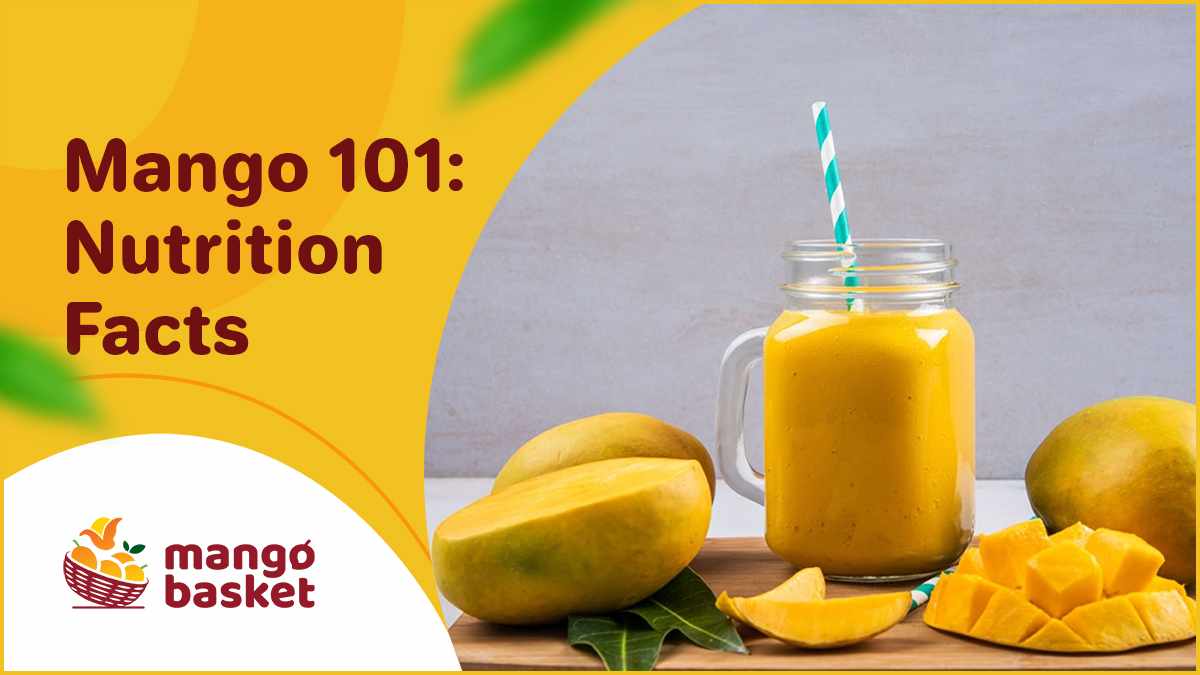Mango 101: Nutrition Facts About Mangoes That Will Surprise You!

Mango is one of the most eaten fruits worldwide, as evidenced by the fruit’s global production of around 55.4 million metric tons per year. They have been found in India and Southeast Asia for the past 4000 years and are cultivated on a huge scale in these areas. There are many varieties of mango that have different tastes, colors, and many other features.
Mangoes are called the “King of Fruits” because of their rich taste. Still, along with flavor, they also have an impressive nutritional advantage, which helps in improving immunity, eyesight, and digestive problems, as well as minimizing the risk of cancer.
Mango 101: Nutrition Facts About Mangoes That Will Surprise You!
Mango Nutrition
USDA gives the following data on important nutrients in mango for a single cup of raw mango –
Calories- 99
Fat- 0.6g
Sodium- 2mg
Carbohydrates- 25g
Fiber- 2.6g
Sugar- 23g
Protein- 14g
Vitamin C: 67% of the RDI
Copper: 20% of the RDI
Folate: 18% of the RDI
Vitamin B6: 11.6% of the RDI
Vitamin A: 10% of the RDI
Vitamin E: 9.7% of the RDI
Vitamin B5: 6.5% of the RDI
Vitamin K: 6% of the RDI
Niacin: 7% of the RDI
Potassium: 6% of the RDI
Riboflavin: 5% of the RDI
Manganese: 4.5% of the RDI
Thiamine: 4% of the RDI
Magnesium: 4% of the RDI
(RDI means reference daily index.)
Calories
A single cup of mango pieces will provide you with around 99 calories, mostly from carbohydrates. Calories mean the amount of energy you will get after eating or drinking that food. Thus, mangoes are low in calories, but they are full of nutrients. The glycemic index of mango is estimated to be 51. The glycemic index of mango is pretty good, and thus it is rich in energy and glucose.
Fat
Mangoes generally do not have any sort of fat, and they can be known as fat-free food, as one cup of servings provides us only 0.6 grams of fat. The fat they provide us is monounsaturated and polyunsaturated, which will not affect our body’s functioning.
Protein
Since mangoes are not that rich in protein, you will find a very small amount of protein percentage (a little bit more than 1 gram) when you consume a whole cup of fresh mango. Proteins are required for muscle building in our body; thus, they are an essential part of our food component.
Carbohydrates
Carbohydrates are your body’s primary source of energy. They help fuel your brain, heart muscles, nervous system, and heart, and thus, your food should provide most of the carbohydrates, especially when from healthy sources. Mangoes are generally rich in carbohydrates. One cup of fresh-cut mango will provide you with around 25g of carbohydrates, 23g of natural sugar, and around 2-3g is fiber.
Vitamin C
Mangoes possess many types of vitamins, particularly a greater portion of vitamin C, which is also known as ascorbic acid and is a member of the water-soluble family of vitamins. One cup of mango (165 g) contains around 60mg, which provides 66% of the daily need that is needed for your day-to-day life. Vitamin C is good for cell health in the body, the immune system, strong connective tissue, and healthy blood vessels.
Vitamin A
Mangoes also have a good amount of vitamin A, which is a fat-soluble vitamin, and you will also get good benefits from them for your health. Vitamin A helps in the proper functioning of the heart, lungs, kidneys, eyesight, and immune system. A cup of mango (165 g) will provide around 1785.3 IU, which is around 11% of the total vitamin content of the mango.
Sugar
Mango contains natural sugar, which can contribute to increased blood sugar levels; however, its supply of fiber and antioxidants may help minimize overall blood sugar impact. Over 90% of the calories in mango come from sugar, which may contribute to the increased sugar level in people who have diabetes. One cup of sugar contains around 23 grams, which is quite a good percentage.
Fiber
Fiber is essential in food as it dissolves in water to form a gel-like substance. It gets bound to cholesterol and other fatty acids and promotes their excretion in waste. The fiber content in one serving is around 2.6 grams, which is equivalent to 10% of the daily need for fiber in the body. About 61% of the total dietary fiber in mango is the soluble type, while the rest, 39%, is the insoluble type.
Other important components
Mangoes also include many polyphenols; they have over a dozen polyphenols, including mangiferin, which is a very powerful polyphenol that also acts as an antioxidant inside your body and thus helps in the proper functioning of your body. Mangoes are also a good source of folate for several other vitamins, i.e., vitamins B, A, C, K, and E, which help improve our immunity system.
Conclusion
In this blog post, we have discussed the various important nutritional aspects of mangoes, the varieties of nutrients, carbohydrates, fiber, vitamins, etc., found in the mangoes, and how important they are to us in our body system.
Mangoes are beneficial during pregnancy, too. We’ve covered the whole topic; you can read it here.
Mango is a delicious fruit packed with nutrients that help fight various diseases and maintain a healthy lifestyle. It helps in digestion, lowers cholesterol, boosts immunity, etc. Hence, mangoes are fully filled with nutrition and various other important minerals that are very beneficial for our health and other biological systems.











Leave a Reply